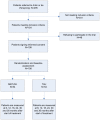Day Hospital Mentalization-Based Treatment (MBT-DH) versus treatment as usual in the treatment of severe borderline personality disorder: protocol of a randomized controlled trial
- PMID: 24886402
- PMCID: PMC4045960
- DOI: 10.1186/1471-244X-14-149
Day Hospital Mentalization-Based Treatment (MBT-DH) versus treatment as usual in the treatment of severe borderline personality disorder: protocol of a randomized controlled trial
Abstract
Background: Severe borderline personality disorder is associated with a very high psychosocial and economic burden. Current treatment guidelines suggest that several manualized treatments, including day hospital Mentalization-Based Treatment (MBT-DH), are effective in these patients. However, only two randomized controlled trials have compared manualized MBT-DH with treatment as usual. Given the relative paucity of data supporting the efficacy and cost-effectiveness of MBT-DH, the possible influence of researcher allegiance in one of the trials, and potential problems with the generalization of findings to mental health systems in other countries, this multi-site randomized trial aims to investigate the efficacy and cost-effectiveness of manualized MBT-DH compared to manualized specialist treatment as usual in The Netherlands.
Methods/design: The trial is being conducted at two sites in The Netherlands. Patients with a DSM-IV-TR diagnosis of borderline personality disorder and a score of ≥ 20 on the Borderline Personality Disorder Severity Index were randomly allocated to MBT-DH or treatment as usual. The MBT-DH program consists of a maximum of 18 months' intensive treatment, followed by a maximum of 18 months of maintenance therapy. Specialist treatment as usual is provided by the City Crisis Service in Amsterdam, a service that specializes in treating patients with personality disorders, offering manualized, non-MBT interventions including family interventions, Linehan training, social skills training, and pharmacotherapy, without a maximum time limit. Patients are assessed at baseline and subsequently every 6 months up to 36 months after the start of treatment. The primary outcome measure is the frequency and severity of manifestations of borderline personality disorder as assessed by the Borderline Personality Disorder Severity Index. Secondary outcome measures include parasuicidal behaviour, symptomatic distress, social and interpersonal functioning, personality functioning, attachment, capacity for mentalizing and quality of life. Cost-effectiveness is assessed in terms of the cost per quality-adjusted life year. Outcomes will be analyzed using multilevel analyses based on intention-to-treat principles.
Discussion: Severe borderline personality disorder is a serious psychological disorder that is associated with high burden. This multi-site randomized trial will provide further data concerning the efficacy and cost-effectiveness of MBT-DH for these patients.
Trial registration: NTR2175.
Figures
References
Publication types
MeSH terms
Associated data
LinkOut - more resources
Full Text Sources
Other Literature Sources


